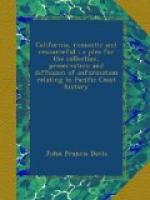[3] United States vs. Castellero, 2 Black (67 U. S.), 17-371.
[4] A vivid and most interesting account of General Sutter’s helpless attempt to obtain from the military Governor a recognition of his title to the land upon which his tail race was situated is given by General W. T. Sherman: “I remember one day in the spring of 1848, that two men, Americans, came into the office and inquired for the Governor. I asked their business, and one answered that they had just come down from General Sutter on special business, and wanted to see Governor Mason in person. I took them in to the Colonel, and left them together. After sometime the Colonel came to his door and called to me. I went in, and my attention was directed to a series of papers unfolded on his table, in which lay about half an ounce of placer gold . . . . . . . Colonel Mason then handed me a letter from Captain Sutter, addressed to him, stating that he (Sutter) was engaged in erecting a sawmill at Coloma, about forty miles up the American Fork, above his fort at New Helvetia, for the general benefit of the settlers in that vicinity; that he had incurred considerable expense, and wanted a ‘preemption’ to the quarter section of land on which the mill was located, embracing the tail-race in which this particular gold had been found. Mason instructed me to prepare a letter, reciting that California was yet a Mexican province, simply held by us as a conquest; that no laws of the United States yet applied to it, much less the land laws or preemption laws, which could only apply after a public survey. Therefore it was impossible for the Governor to promise him (Sutter) a title to the land; yet, as there were no settlements within forty miles, he was not likely to be disturbed by trespassers. Colonel Mason signed the letter, handed it to one of the gentlemen who had brought the sample of gold, and they departed . . . . . . . That gold was the first discovered in the Sierra Nevada, which soon revolutionized the whole country, and actually moved the whole civilized world.” — Personal Memoirs, p. 68.
[5] Cross vs. Harrison, 16 Howard (57 U. S.), 164, 192.
[6] “In 1850 the Congress of the United States passed what is called a series of compromise measures. Among them was a fugitive slave law, the indemnity to Texas, the creation of territories in Utah and New Mexico, the admission of California, and the change in the Texas boundary. Four of them had direct relation to the question of slavery, and one was the admission of this State. Being in Congress, as a member of the House, at that time, I know well what you remember. The admission of California as a State was delayed for some nine or ten months, because the leaders of the Pro-Slavery Party were determined to secure their own way on all the other measures before California should he admitted.” — E. D. Baker, Forest Hill speech, Aug. 19, 1859.
[7] J. Ross Browne: Debates in the Convention of California on the Formation of the Constitution in 1849, pp. 304, 322, 323.




